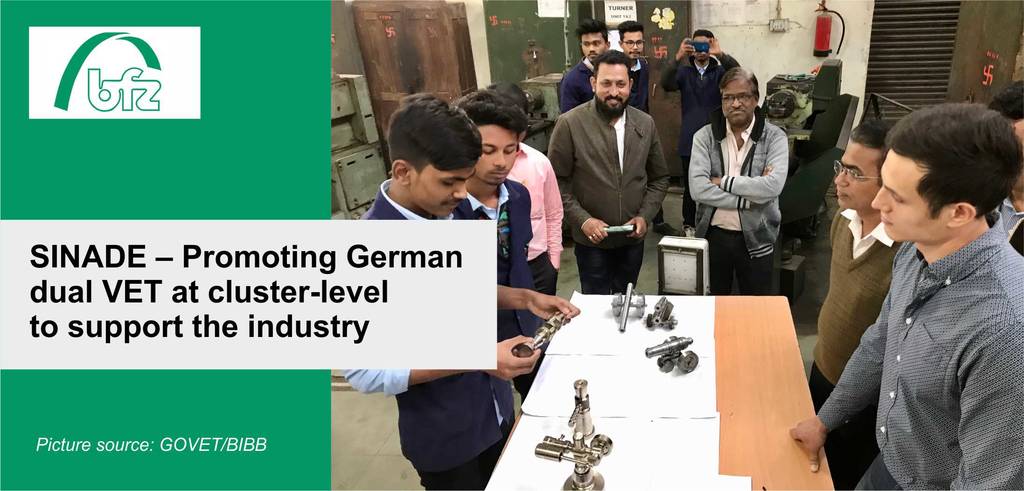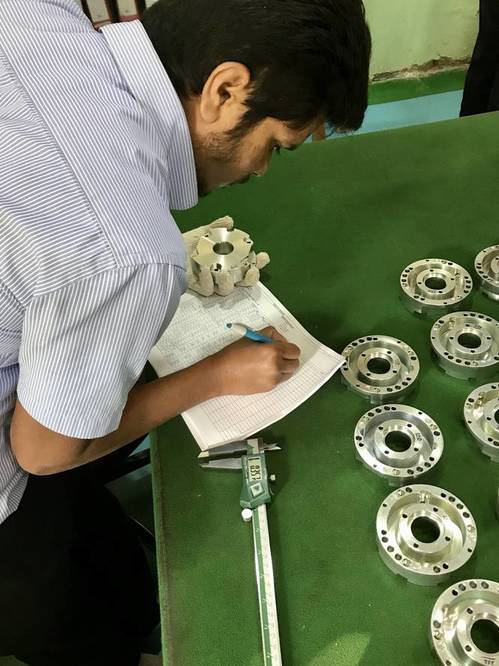The German Federal Ministry for Education and Research (BMBF) supports the development of strategies and competencies in the Indian system for vocational training. In the face of increasing shortage of skilled labor, India’s growing industry is now exploring cooperation with the government in their efforts to improve the efficiency of existing training structures. The Indian vocational training institutions are looking at Germany to support modernization of their instruments and to enhance the capacities of their local expertise.
Need for cluster-level approach to implement German dual VET
The cluster-level approach was confirmed as the most promising way to establish results in a short time span while focusing on a certain area and a specific industry sector. Looking at India’s vast size, population and industry, the cluster-level approach provides the opportunity to develop structures and processes in a defined area which can be applied, tested and then possibly transferred to other clusters. The potential for transfer is huge, as there are currently more than 1000 clusters already existing among Indian industries.
How SINADE provides German VET expertise at the cluster -level
The project SINADE (Strengthening of Industry-oriented Approaches for Dual Education and Training) was approved by the BMBF in August 2019. The German project implementation organization is bfz (Professional Training and Development Centers of the Bavarian Business Associations), one of the largest training providers in Germany with a large pool of in-house experts from all sectors. bfz also has more than 20 years experience in executing knowledge transfer process from Germany to international partners around the globe.
SINADE started in India with three clusters. After completing the analysis by German vocational training experts in India, following clusters were confirmed in early 2020:
- Lucknow Excellence Cluster Association (Automotive, Lucknow)
- Automotive Components Manufacturers Association (ACMA) (Automotive Components, India-wide)
- Nagpur Auto and Engineering Cluster (Machinery, Automotive, Engineering in Nagpur).
Key partners of the project comprise the cluster organizations, which provide local contacts and are the local partners for the implementation of activities. The project further cooperates with the Alliance of Indian MSMEs (AIM).
 SINADE: Project goals and implementation
SINADE: Project goals and implementation
The goal of the project is to improve the performance and efficiency of the vocational training structures and processes among the different stakeholders in the clusters, based on the experience of the dual system in Germany.
First-hand experience of German Dual VET
In India, often the private sector and public institutions do not cooperate well in the process of vocational training, resulting in many resources being lost. Therefore, the main objective of SINADE is to establish common structures and a common cooperation in training and capacity building. To achieve this, the first initiative will bring ten people from each cluster to Germany for a six-week long training on methods and implementation of efficient vocational training processes.
The training in Germany is important in order to expose the Indian partners to the TVET system in Germany in all its aspects. Course participants will also get an opportunity to visit number of German companies and observe how their in-house training departments and systems work. A variety of German training experts and trainers will be made available as resourceful trainers. The learnings from the dual system and its applicability in the Indian context will also be part of this training program. The Indian experts will also visit German companies and learn about their collaboration with public training institutions in the process of skill development and training of young people.
Post- Germany visit cooperation and follow-up
After returning to India, the Indian experts will be the core group for the implementation of new measures in their clusters and will become managers of vocational training efforts. There will be a permanent line of short trainings and mentoring efforts offered to the Indian experts in order to ensure their permanent support and further training regarding management of training structures and procedures. Therefore, it is important that the members of the groups are from different stakeholders: from private companies, government training institutions and cluster organizations.
Together, they will develop networks for the joint development of training and capacity building measures in their clusters and their implementation. It is important that different stakeholders are working together, in order to include the needs and ideas of each company and institution. Only then can the industry clusters and in fact India successfully deal with the lack of skilled people in the face of a growing industry. The close cooperation of public and private sector in vocational training and technical education is a key feature of the German system, which proved to be successful in bringing young people into work while addressing the needs of industry immediately (LINK). However, this also requires a certain contribution of infrastructure, trained personnel, finance and most of all commitment from each company.
Collaboration for training and examination
 Each cluster will establish a Common Faculty Center (CFC), where new training courses (short term and long term) will be taking place. Such centers (or their definite plans) already exist in the selected clusters, and it is a good timing for the project to render its support through the help of German experts. In the CFC, all members of the cluster, private or public, can train their staff and contribute their ideas to bring the training content in line with their specific training needs.
Each cluster will establish a Common Faculty Center (CFC), where new training courses (short term and long term) will be taking place. Such centers (or their definite plans) already exist in the selected clusters, and it is a good timing for the project to render its support through the help of German experts. In the CFC, all members of the cluster, private or public, can train their staff and contribute their ideas to bring the training content in line with their specific training needs.
The project will also support the training and establishment of joint examination procedures. In line with the new training content, a modernized examination board will be established.
Joint examinations are taken by an examination boards which consists of representatives from both the public and private sectors. Specialized examiners from the companies will join in taking the exam of a course graduate together with examiners from public training institutions and the cluster organization. It is important that people who train do not take part in the examination, in order to guarantee a fair and independent examination process.
Finally, the project aims at to identify instruments for the transfer of the lessons learnt from the three clusters to other clusters across India. One further cluster will be selected at the end of the project and options for the transfer of know-how will be evaluated. This means that the final outcome will be a universal set of tools ready for the transfer to any other cluster.
For further questions, the project coordinator at German partner bfz can be contacted at jens.kayser@bbw.de.
Related article: What India can learn from the German Dual Model of VET – Read more: https://nationalskillsnetwork.in/what-india-can-learn-from-the-german-dual-model-of-vet/





